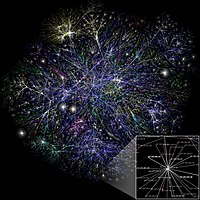
Photo from wikipedia
Helping behaviour is thought to play a major role in the evolution of group-living animals. Yet, it is unclear to what extent human males and human females use the same… Click to show full abstract
Helping behaviour is thought to play a major role in the evolution of group-living animals. Yet, it is unclear to what extent human males and human females use the same strategies to secure support. Accordingly, we investigate help-seeking over a 5-year period in relation to gender using data from virtually all adults in two Tamil villages (N = 782). Simulations of network dynamics (i.e. stochastic actor-oriented models) calibrated to these data broadly indicate that women are more inclined than men to create and maintain supportive bonds via multiple mechanisms of cooperation (e.g. reciprocity, kin bias, friend bias, generalized exchange). However, gender-related differences in the simulated dynamics of help-seeking are modest, vary based on structural position (e.g. out-degree), and do not appear to translate to divergence in the observed structure of respondents' egocentric networks. Findings ultimately suggest that men and women in the two villages are similarly social but channel their sociality differently. This article is part of the theme issue ‘Cooperation among women: evolutionary and cross-cultural perspectives’.
Journal Title: Philosophical Transactions of the Royal Society B: Biological Sciences
Year Published: 2022
Link to full text (if available)
Share on Social Media: Sign Up to like & get
recommendations!